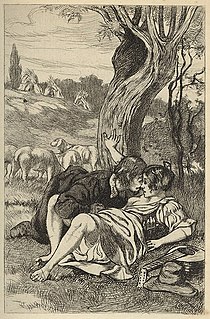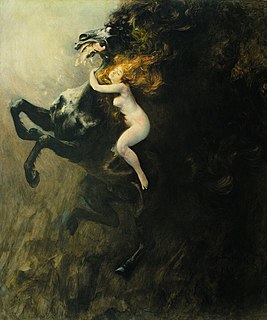
Jacques Marie Émile Lacan was a French psychoanalyst and psychiatrist who has been called "the most controversial psycho-analyst since Freud". Giving yearly seminars in Paris from 1953 to 1981, Lacan influenced many leading French intellectuals in the 1960s and the 1970s, especially those associated with post-structuralism. His ideas had a significant impact on post-structuralism, critical theory, linguistics, 20th-century French philosophy, film theory, and clinical psychoanalysis.
Paraphilia is the experience of intense sexual arousal to atypical objects, situations, fantasies, behaviors, or individuals. Such attraction may be labeled sexual fetishism. No consensus has been found for any precise border between unusual sexual interests and paraphilic ones. There is debate over which, if any, of the paraphilias should be listed in diagnostic manuals, such as the Diagnostic and Statistical Manual of Mental Disorders (DSM) or the International Classification of Diseases (ICD).
Frotteurism is a paraphilic interest in rubbing, usually one's pelvic area or erect penis, against a non-consenting person for sexual pleasure. It may involve touching any part of the body, including the genital area. A person who practices frotteuristic acts is known as a frotteur. Toucherism is sexual arousal based on grabbing or rubbing one's hands against an unexpecting person. It usually involves touching breasts, buttocks or genital areas, often while quickly walking across the victim's path. Some psychologists consider toucherism a manifestation of frotteurism, while others distinguish the two. In clinical medicine, treatment of frotteuristic disorder involves cognitive behavior therapy coupled with the administration of a SSRI.
Biastophilia and its Latin-derived counterpart raptophilia, also paraphilic rape, is a paraphilia in which sexual arousal is dependent on, or is responsive to, the act of assaulting an unconsenting person, especially a stranger. Some dictionaries consider the terms synonymous, while others distinguish raptophilia as the paraphilia in which sexual arousal is responsive to actually raping the victim.

Countertransference is defined as redirection of a psychotherapist's feelings toward a client – or, more generally, as a therapist's emotional entanglement with a client.
Somnophilia, also known as sleeping princess syndrome and sleeping beauty syndrome, is a paraphilia in which an individual becomes sexually aroused by someone who is unconscious. Sexology scholar John Money stated that the condition has a high degree of correlation throughout history with incest and may progress to necrophilia. The Dictionary of Psychology categorized somnophilia within the classification of predatory paraphilias.
In psychiatry, the term dippoldism is used to refer to the spanking of minors for sexual motives.
Paraphilic infantilism, also known as autonepiophilia,psychosexual infantilism, and adult baby syndrome is a sexual fetish that involves role-playing a regression to an infant-like state. Behaviors may include drinking from a bottle or wearing diapers. Individuals may engage in gentle and nurturing experiences or be attracted to masochistic, coercive, punishing or humiliating experiences. Diaper fetishism involves "diaper lovers" wearing diapers for sexual or erotic reasons but may not involve infant-like behavior. Individuals who experience both of these things are referred to as adult baby/diaper lovers (AB/DL). When wearing diapers, infantilists may urinate and/or defecate in them.
The Imaginary order is one of a triptych of terms in the psychoanalytic theory of Jacques Lacan, along with the symbolic and the real. Each of the trio of terms emerged gradually over time, and underwent an evolution during the development of Lacan's thought. "Of these three terms, the 'imaginary' was the first to appear, well before the Rome Report of 1953 ... [when t]he notion of the 'symbolic' came to the forefront". Indeed, looking back at his intellectual development from the vantage point of the 1970s, Lacan epitomised it as follows:
I began with the Imaginary, I then had to chew on the story of the Symbolic ... and I finished by putting out for you this famous Real.
Malignant narcissism is a psychological syndrome comprising an extreme mix of narcissism, antisocial behavior, aggression, and sadism. Grandiose, and always ready to raise hostility levels, the malignant narcissist undermines families and organizations in which they are involved, and dehumanizes the people with whom they associate.
Identification is a psychological process whereby the individual assimilates an aspect, property, or attribute of the other and is transformed wholly or partially by the model that other provides. It is by means of a series of identifications that the personality is constituted and specified. The roots of the concept can be found in Freud's writings. The three most prominent concepts of identification as described by Freud are: primary identification, narcissistic (secondary) identification and partial (secondary) identification.

Partialism is sexual interest with an exclusive focus on a specific part of the body other than the genitals. Partialism is categorized as a fetishistic disorder in the DSM-5 of the American Psychiatric Association only if it causes significant psychosocial distress for the person or has detrimental effects on important areas of their life. In the DSM-IV, it was considered a separate paraphilia, but was merged into fetishistic disorder by the DSM-5. Individuals who exhibit partialism sometimes describe the anatomy of interest to them as having equal or greater erotic attraction for them as do the genitals.
Olfactophilia or osmolagnia is a paraphilia for, or sexual arousal by, smells and odors emanating from the body, especially the sexual areas. Sigmund Freud used the term osphresiolagnia in reference to pleasure caused by odors.
Martin Paul Kafka is an American psychiatrist best known for his work on sex offenders, paraphilias and what he calls "paraphilia-related disorders" such as sex addiction and hypersexuality.
Coprophilia, also called scatophilia or scat, is the paraphilia involving sexual arousal and pleasure from feces. In the Diagnostic and Statistical Manual of Mental Disorders (DSM), published by the American Psychiatric Association, it is classified under 302.89 – Paraphilia NOS and has no diagnostic criteria other than a general statement about paraphilias that says "the diagnosis is made if the behavior, sexual urges, or fantasies cause clinically significant distress or impairment in social, occupational, or other important areas of functioning". Furthermore, the DSM-IV-TR notes, "Fantasies, behaviors, or objects are paraphilic only when they lead to clinically significant distress or impairment ".
Michael B. First is an American psychiatrist who focuses on diagnostic criteria for mental disorders. He is Professor of Clinical Psychiatry at Columbia University. First was one of the editors of DSM-IV-TR, the Editor of Text and Criteria for the DSM-IV, and the editor of the Structured Clinical Interview for DSM-IV. He also served as consultant to the World Health Organization for the revision of ICD-11.
Narcissistic defenses are those processes whereby the idealized aspects of the self are preserved, and its limitations denied. They tend to be rigid and totalistic. They are often driven by feelings of shame and guilt, conscious or unconscious.
Lacanianism is the study of, and development of, the ideas and theories of the dissident French psychoanalyst Jacques Lacan. Beginning as a commentary on the writings of Freud, Lacanianism developed into a new psychoanalytic theory of humankind, and spawned a worldwide movement of its own.
Sexual sadism disorder is the condition of experiencing sexual arousal in response to the extreme pain, suffering or humiliation of others. Several other terms have been used to describe the condition, and the condition may overlap with other conditions that involve inflicting pain. It is distinct from situations in which consenting individuals use mild or simulated pain or humiliation for sexual excitement. The words sadism and sadist are derived from Marquis de Sade.




